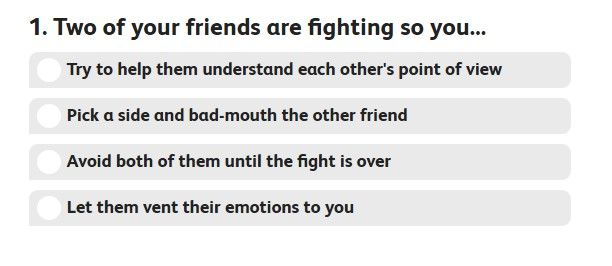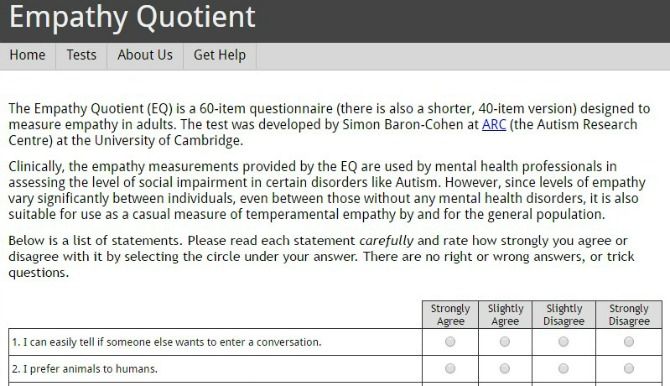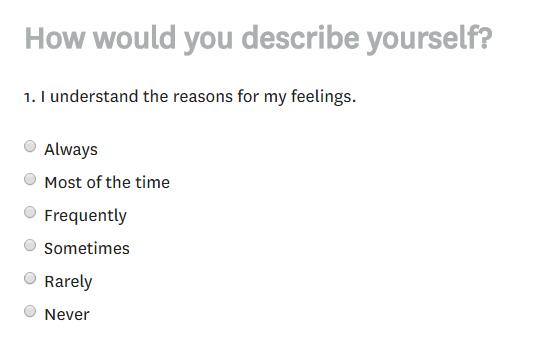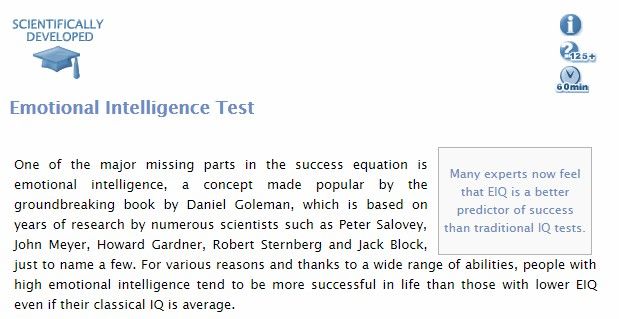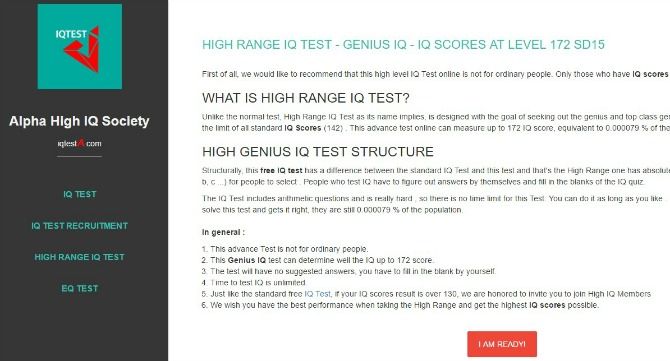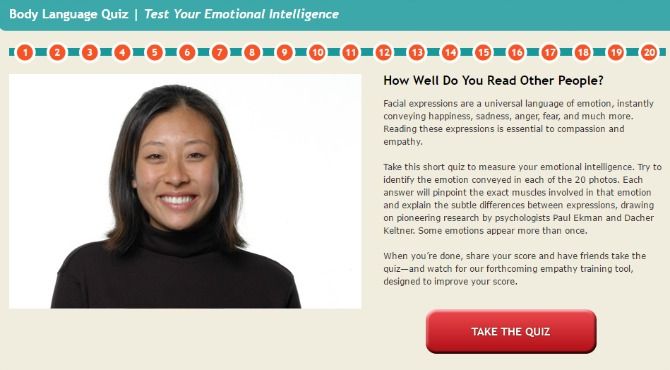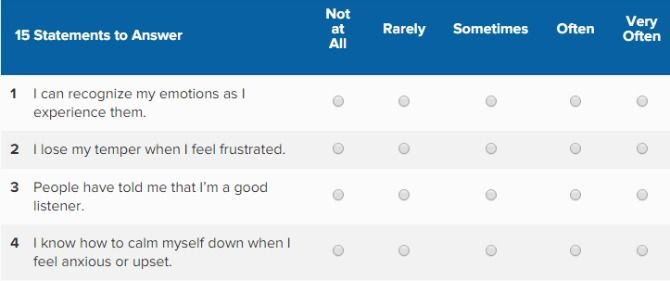When we talk about intelligence, a common term that's offered up is IQ. When it comes to emotional intelligence, however, the go-to phrase is EQ.
Broadly speaking, emotional intelligence (EQ) is a person's knack for both identifying and managing the emotions of themselves and of others.
There are three skills commonly associated with EQ: emotional awareness, the ability to apply said emotions to everyday problems, and the ability to manage your own emotions, as well as the emotions of others. While an increasingly popular way to discuss emotions, not everyone is sold on the idea of EQ. You be the judge.
Before you begin, be diligent. One way to identify a strong EQ test is to first check if it's based on actual research. Doing a bit of reading and research on your own can help you spot a good EQ test.
Here are eight EQ tests you can take to measure just how emotionally intelligent you may or may not be.
1. Very Well's EQ Test
Developed by author and educator Kendra Cherry, the EQ test from Very Well is a 10-question process that looks to answer one simple and straightforward question: how emotionally intelligent are you?
The test is simple. A quick run through it and you begin to feel as if the four options given for each of the 10 questions are bound to a rigid set of ideas or way of thinking. After you complete the 10 questions, you're brought to a screen that lets you know if you have high or low emotional intelligence.
While it does feel a bit over-simplified at times, the EQ test from Very Well is free and a quick way for you to gauge where your EQ stands, making it a good jumping-off point for most people.
It also clarifies that the test is not a tool for medical advice and should not be substituted as such.
2. Psychology Tools's EQ Test
The Empathy Quotient test from Psychology Tools is a 60-item questionnaire that asks a wide variety of questions. For each question, you're asked if you strongly agree, slightly agree, slightly disagree, or strongly disagree.
The questions range from things such as "I prefer animals to humans" to "I tend to have very strong opinions about morality." Simon Baron-Cohen from the Autism Research Centre at the University of Cambridge developed the test. There's also a 40-question version if you're short on time.
This test makes it clear there are no right or wrong answers, and also no "trick" questions. It was developed using three sources of research dating between 2004 and 2013.
3. Harvard Business Review Test
The 25-question quiz from Harvard Business Review was posted by Annie McKee, senior fellow at the University of Pennsylvania and the director of the PennCLO Executive Doctoral Program.
The test does a good job of getting you in the right mindset. It reminds you to respond to the statements as honestly as possible, and the results give you an idea of where you might need some improvement.
Another strength of this test is that it encourages you to get perspective from other people. It advises you to review your scores and then ask a trusted friend or two to evaluate you using the same statements.
4. PsychTests' EQ Test
At first glance, the EQ test from the website PsychTests feels a bit like clickbait. For example, before they actually take the test, visitors are forced to click on a box that reads, "I agree to use this test for personal purposes only."
When they do so, however, a pop-up advertisement appears.
That aside, this EQ test is also among the more in-depth ones on this list. There is a total of 341 questions on the test, and most have at least seven responses to choose from. Further, the questions aren't all completely text-based. For example, the first question features a photo of a group that appears to be friends, and you're asked to identify what one of the people is feeling at that very moment.
When the test is over, visitors receive a "Snapshot Report" with an option to purchase the full results.
While the test seems deep, some may be concerned that the price for full results is not disclosed up front. Further, there's no clear indication of how the test was developed or exactly how credible it is.
5. Alpha High IQ Society Test
The EQ test from Alpha High IQ Society is a free, timed test in which visitors are given 24 minutes to complete the questions. There are just 10 questions, and while the site does not say how its EQ test was developed, it does say that "the EQ test is given by Daniel Goleman, author of the best-selling book in 1995: Emotional Intelligence."
The site is mainly known for its free IQ tests, but includes an EQ test option as well. The site reads, "Although there is currently no test that can measure EQ as precisely as IQ, the following test will give you the closest EQ result."
For most, the test won't take anywhere close to the 24 minutes given on the site's countdown timer. To view results, visitors are first asked to provide their name and an email address.
6. University of California, Berkeley Test
The EQ test from the University of California, Berkeley is unique because it's more visual in nature than the others included in this list.
For each of the test's 20 questions, visitors see a photo of a person's face emitting a specific emotion. Visitors are then asked to identify the emotion from one of four choices.
After each answer is given, the test lets you know if you were right or wrong. It then gives you some helpful pointers on how facial cues can be used to identify specific emotions.
When the test is complete, it gives you the option to sign up for an e-newsletter on the topic, but it doesn't feel gimmicky or forced.
7. MindTools Test
The strength of the EQ test from MindTools is its simplicity. It consists of just 15 statements and asks you to evaluate each as you actually are, as opposed to how you think you should be. The scale ranges from "Not at all" to "Very often."
When the test is completed, visitors will fall into one of three categories. The test will reveal if you have "great" emotional intelligence, if your EQ is just OK, or if you have some work to do.
Another strong feature of the MindTools test is that it gives a solid breakdown of what emotional intelligence actually is. It lists five key characteristics of EQ, along with tips on how you can improve each.
It also gives you an idea of how each characteristic relates to the questions included in the test.
8. University of Central Florida EQ Test
The My Emotions website includes a number of free online quizzes, including one focused on EQ. It immediately gives visitors a sense of credibility because it's from an educational institution -- in this case, the University of Central Florida.
Further, the EQ test specifically gives an air of educational research. The title of the project is "An Examination of Emotional Competency" and it also lists a principal investigator (Bridget McHugh) and a faculty supervisor (Dr. Dana Joseph).
Not only that, but there's actual contact information for Joseph, should users have any questions, concerns or complaints. Before beginning the test, users must give consent to participate in this educational research and indicate that they're at least 18 years old.
Finish a test and check your self-emotion appraisal score on a seven-point scale. Run through the breakdown of why you were given this score, and browse the links (mainly from accredited educational resources) where you can learn more about emotional intelligence.
Cautionary Notes
Are all EQ tests are equal? No. Some tests feel as if they honestly want to help you get a handle on your personal EQ level. A few tests will feel more like they were created to either sell you something or gather your personal information.
When searching for a test that's good for you, consider using something like "[EQ test] review" to see what others are saying about their experiences with that particular test.
The Value of Paid Tests
Some tests are available for a nominal fee, and not all of these are scams. There are a number of credible EQ tests that cost money, but offer additional value in the test results.
These for-pay tests often include regular updates so you can monitor you EQ beyond a simple one-off test. As always, be sure to do a bit of research before committing to any of these particular tests.
How Will Your EQ Measure Up?
Learning about emotional intelligence can be a valuable experience, but it's important for you to know where to look.
The tests included here can offer some insights into your strengths and weaknesses as an emotionally intelligent being.
How will you use that knowledge to improve yourself? How about your relationships with others?
Image Credit: Gearstd via Shutterstock.com


